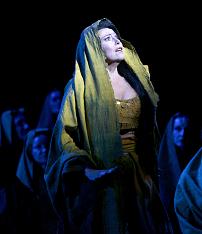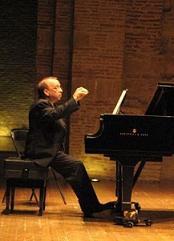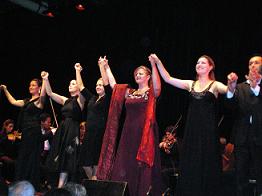
A symbolic moment. On the very day of our interview, Elizabeth Vidal, the coloratura soprano, “received the key to her mailbox at the Nice Regional Conservatory of Music” where Christian Estrosi appointed her as a Professor of Opera. A return to her roots for this authentic Nice native with a more international than French career: “the place was already taken,” she gently explains with her slightly tilted head and a nearly naive smile that she knows how to exploit on stage in all its possibilities. Elizabeth Vidal has often exercised her “thirst for giving” away from the stage. She thus created her first association, “Operaction,” in Rueil-Malmaison, in reaction to a “crisis in vocal technique” for which she attributes “responsibility” to the philosophy developed several years ago by “one of the heads of singing policy at the Ministry of Culture.” It was, she explains, about establishing a “complementary structure” intended to put young singers “in contact with the public,” to “promote emotional exchange” and to manage “to break free from just technical parameters.” Singing, for Elizabeth Vidal, remains, first of all, an “artistic message”: singing “enriches timbres and liberates the voice.”

She seemingly has nothing left to prove in her international career: conducted by the greatest conductors such as Sir John Eliot Gardiner, Richard Bonynge, Semyon Byshkov, Horst Stein, René Jacobs, Serge Baudo, or Michel Plasson, and ovated on great international stages like Covent Garden, Verona Arena, La Fenice, Lincoln Center in New York, BBC Proms in London, Hamburg, Berlin, Vienna, she was named the best coloratura soprano of the year 2000 in Italy. Last year, she undertook a world tour of a virtuoso arias recital in Tokyo, at the Séoul Art Center, Teatro Politeama in Palermo, Herkulesaal in Munich, and Teatro Colón in Buenos Aires. The return to her roots in Nice was thus progressively initiated in 2003 when local officials, from Beaulieu to Tourette-Levins, passing through Cagnes sur mer, then Nice, supported her in creating a new local school capable of ensuring “high-performance training,” the Mediterranean Opera Arts Center (C.A.L.M.). Despite the rather soothing acronym, the goal remains dynamic and combative: “to arm young singers,” “to enable them to approach their career,” “to teach them both vocal techniques and gentle singing.” Putting words into action, Elizabeth Vidal stands up to explain the necessity of “diaphragmatic support in harmony with emotion.” “This entire area,” she says, “must accompany the exhalation of air.” As a result of her international reputation, C.A.L.M. already welcomes about fifty participants from over a dozen nationalities: People’s Republic of China, Taiwan, South Korea, Russia, Croatia, Romania, Belgium, Spain, Italy, Great Britain, the United States, and of course, France. During auditions, she spots, for example, “awkward neck positions that impair vocal roundness,” makes them “open the space in their mouths,” advises them to “provide a better base for the pelvis,” all elements that, according to her, also contribute to the psychological balance of opera artists.
For the 2009/2010 C.A.L.M. program, there is the Italian opera of the XXth century as well as an incursion into the field of oratorio: questioned about the risks of such a change in vocal spectrum for such young artists, the soprano confidently responds: “when the vocal instrument is liberated, it opens to every register,” before continuing: “control of vibrato and ornamentation no longer poses the same problems, unlike those specialized in baroque music.” A “repertoire she denies all the less” since she brilliantly made her debut in it with Sir John Eliot Gardiner.

Present by her side, besides her husband, the baritone André Cognet, is the pianist Bob Gonella, who was invited that evening to the Master Class at the Beaulieu sur mer casino. An organist by training, this American has been leading the singing school of the Toulouse Opera for over 20 years, a career alongside the famous conductor Michel Plasson. While vocal technique questions are rather reserved for Elizabeth Vidal, Bob Gonella insists on the “importance” for an artist “to be in their character, to tell us, to speak to us, to make us cry.” Singing, he further explains, “must be like life.” “I do not work directly on the technique but on the everyday life gestures, so that this life comes through in singing.” “My advice,” he adds, “aims to return intelligence, availability, and freedom to the body.” “The vocal gesture is holistic,” he declares in perfect French, still with a few vague traces of an American accent. “The singer’s profession is much more than a voice,” and “too often,” according to him, “technique is a protection, a refuge.” Words that remind one of those developed in his book by Peter Elkus, who accompanied the most significant part of mezzo-soprano Frederica von Stade’s impressive career (https://www.nicepremium.fr/article/peter-elkus-des-verites-personnelles-bonnes…-a-chanter-.3088.html).
 In an adjacent room, a few budding artists take a break: for the young mezzo-soprano Anne Laure, singing is “unfortunately everything,” she says spontaneously. Sitting next to her, Sonia speaks up: “it’s the expression of an emotion,” specifying that she “loves character interpretation.” With biting irony, Thomas, a young baritone, regards singing as a “release”: “I came to singing to overcome my shyness.” And adds: “singing was the opposite, where I was afraid to go.” Finally, Cécilia, from Antibes, concludes: “singing is the reflection of sensitivity and it allows to discover other things.” The impenetrable mystery of voices.
In an adjacent room, a few budding artists take a break: for the young mezzo-soprano Anne Laure, singing is “unfortunately everything,” she says spontaneously. Sitting next to her, Sonia speaks up: “it’s the expression of an emotion,” specifying that she “loves character interpretation.” With biting irony, Thomas, a young baritone, regards singing as a “release”: “I came to singing to overcome my shyness.” And adds: “singing was the opposite, where I was afraid to go.” Finally, Cécilia, from Antibes, concludes: “singing is the reflection of sensitivity and it allows to discover other things.” The impenetrable mystery of voices.
Mediterranean Opera Arts Center (C.A.L.M.)
Email: centrelyriquedenice@orange.fr or c.a.l.m@sfr.fr
Tel: 06 10 64 20 01 or 06 19 59 04 06

